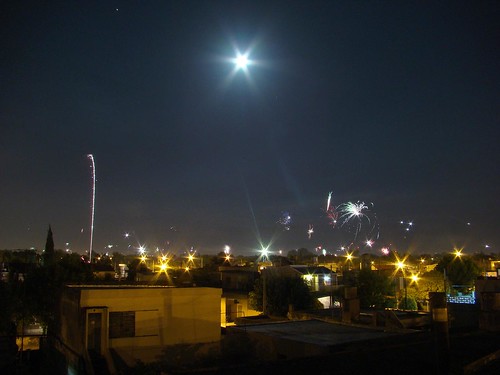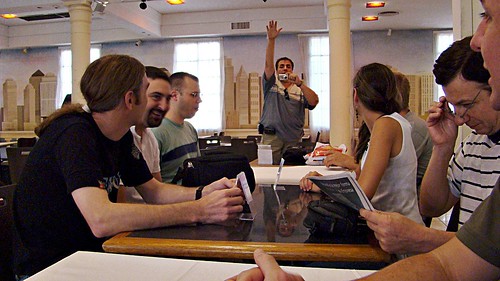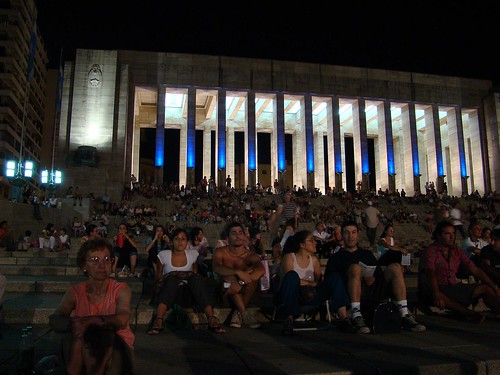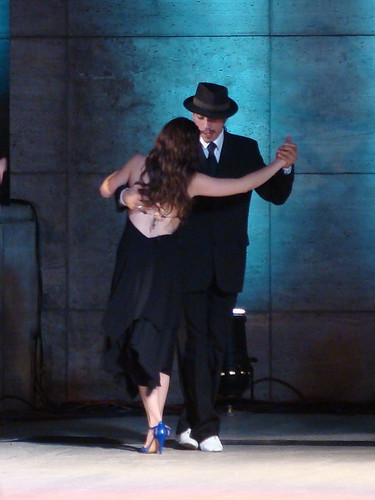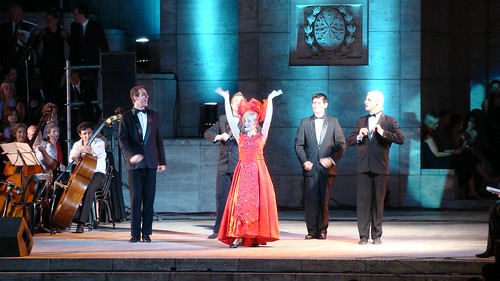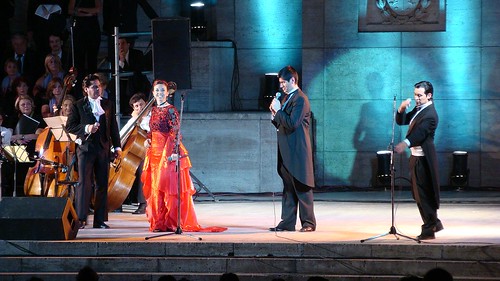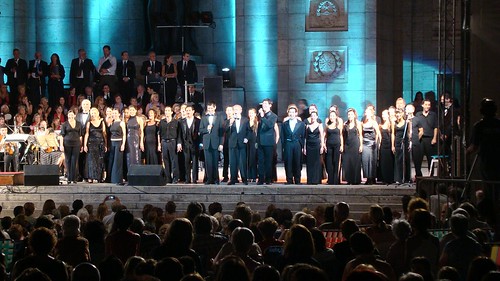Just a few brief notes before I go spend my Saturday in the sun beside someone else's swimming pool in a place cooler than hellish Rosario.
First, I've uploaded a couple of short videos of Fito Páez's concert at the Flag Memorial (Fito Páez en el Monumento, and again Fito Páez en el Monumento) to YouTube, so you can see a bit of what it was like. Check them out. They're fragments, not whole songs.
Second, I've replied to one comment at the Daylight Messing Time post regarding the absurd time zone change starting tomorrow, with further info on the government's energy saving "plan" (the word is a stretch).
Third, I've also replied to comments regarding transport subsidies and prices unrelated to reality in Argentina. Since this is a past post, you may miss my carefully-crafted, thoughtful reply if you don't check it out again.
Lastly, there may or may not be an "old year's balance" as in 2006; I can't promise anything. So in case we don't see each other until 2008, have a Happy New Year!
29 December 2007
Quickies
28 December 2007
Daylight Messing Time
As you should know already, starting next Sunday (December 30) our most wise government has decreed that clocks' time will be advanced one hour in order to (supposedly) save energy. For those not acquainted with DST in Argentina, here's a brief survey.
First of all, most of Argentina is geographically located within time zone GMT−4 (minus four),
that is, four hours behind the Greenwich meridian. Until 1972, it was customary to advance clocks in spring, taking national time to time zone GMT−3, but then somehow somebody forgot to turn the clocks back again after the end of summer, so we were stuck at GMT−3 for good. After that, as unstable governments with incoherent energy policies came and went, DST was applied occasionally, taking the country (or parts thereof) to GMT−2 during the summer. In 2001, President Fernando de la Rúa vetoed a law that attempted to take us back to GMT−4 (with the option of going DST, I suppose, to GMT−3).
Now GMT−3 (our current time zone) is already one hour ahead of our "proper" geographical zone, so GMT−2 is ridiculously advanced. It's the time zone of the Azores islands, located in the middle of the North Atlantic Ocean (think 1,200 miles east of Labrador, Canada). Right now, just past the solstice, there's quite a lot of daylight at 8 PM, and it's still a faint dusk at 9 PM, in the latitude of Rosario, which is only 300 km north of Buenos Aires and almost at the same longitude. With this change to GMT−2, even in late February night won't fall until 8:30 PM (my guess), which is certainly too much.
Besides that, Buenos Aires and Rosario are on the eastern region of Argentina. The western parts of the country should be on the same time zone as Chile (GMT−4, or GMT−3 during DST). When I was in Mendoza last January, even though I objectively knew what to expect, I was a bit disoriented for a couple of days when I noticed that days seemed longer. Indeed, there was plenty of daylight to go by even at 9 PM. I tend to have dinner early for the Argentine norm (generally around 8:30 PM), but in Mendoza that felt outrageously early. Mendoza is at the same latitude as Rosario, but it's 8 degrees of longitude west of it, so if GMT−3 is a stretch for Rosario, it's completely off for Mendoza, and of course for every other city in the west of Argentina.
Worst of all, as you go south towards extreme latitudes, the difference in daylight hours between seasons becomes extreme too: in the summer the sun rises much earlier and sets much later than in the winter. Add a misfit DST scheme to that, and you can expect having the sun shining in its full sunset splendour at 10 PM over northern Patagonia. I'm heading there, so I feel I'm an interested party.
One alternative to this approach would be to employ DST by regions. The central-eastern part of Argentina might need it, but the rest probably doesn't. This, however, would've required careful consideration, planning and coordination among several districts, which was of course utterly impossible, with local governments too busy using public funds and political machines for their political campaigns and all. And why might the national government have anyone sit down and discuss the pros and cons of DST, if the Presidenta can order our representatives in Congress to have the DST law passed in one day?
It's nonetheless better this way, I think, considering what happens when you let the provinces free to do as they choose. I still remember a few years ago, when Santa Fe advanced the clock and Buenos Aires didn't (or was it the other way round?) and the porteño TV programs we get in our local channels were all off by one hour. (TV wouldn't be a problem for me nowadays, being such unwatchable crap.)
There's no clear evidence that DST will help save power by any significant amount, and it's a good guess that it will create additional problems. I wonder, did anyone responsible for the time change take a few days to get acquainted with the scientific (non-)basis for DST? Probably not. Christmas is just past, the New Year is coming, who wants to read up on fact-based studies? Let us vote and be merry, for tomorrow we die!
27 December 2007
Fito Páez at the Flag Memorial
Fito Páez gave a free year's end recital last night at the Flag Memorial. Fito, 43, is well-known in the Spanish-speaking music scene. He's also among the most recognizable Rosarinos in Argentina and the world, not nearly a universal figure like Ernesto Guevara, but trailing behind in the good company of Alberto Olmedo and Roberto Fontanarrosa... which arguably makes him (Fito) the most famous living Rosarino. For most old-time rock nacional fans he ranks only second to Charly García. Though Charly, now 56, has been slowly sinking into drug-induced incoherence for decades (while still bringing forth great music), Fito redid his juvenile persona as he was nearing his forties, and he's now such a respectable music/show businessman that you can actually go to a concert of his with your children and your parents.
That, incidentally, seems to be what many did last night. The Monumento was packed — 20,000 people covering the Courtyard's stairs, the Propylaeum, and even the back part (where you could see Fito via a couple of large projection screens).
I've been a fan since I was a teenager, and continued to be until my early 20s, when Fito started taking on a more lightweight style. Therefore I found myself a bit lost at the beginning of the concert, when he started singing his oldest songs (the ones I was too young to know when they first came out), and then again when he presented his latest CD. Then he moved into the more familiar 1990s hits and I could sing (scream) along with the rest.
I don't particularly like artists who move from their home town to seek fortune elsewhere and never come back, and everybody who's heard me speaking of Fito knows what I think. He's a superb composer and musician, and when he moved to Buenos Aires it was simply the only thing he could do if he wanted his career to advance. But he didn't return, and he doesn't come to Rosario except on very rare occasions, and then he says what singers always say on every stop of a gig — "this place is the best" — and sings the song he composed about Rosario, with a couple of local references that make the public roar with delight, and that's it. Well, Fito, if you love your birth town so much, why don't you move back? Rosario's larger and more alive and sophisticated today than it was in the 1960s and 1970s, and with modern communications and technology you could set up your own studio and label here, instead of in Buenos Aires, and nobody would notice the difference. And we could see you more often as well.
All in all, despite the above, it was a very good show, technically and emotionally. I hadn't heard Fito's songs in ages and last night I sang beautiful lyrics I didn't know I still remembered. Good for him — I felt like I was 20 again.
PS: I've uploaded a couple of short videos (Fito Páez en el Monumento, and again Fito Páez en el Monumento) to YouTube, so you can see a bit of what the concert was like.
26 December 2007
Fly me to the moon (by bus)

The above are prepaid cards of the kind used by urban buses in Rosario, worth 6 trips each. The one on the left shows the price of the bus ticket until yesterday (AR$1.20, discounted to 1.15 in 6-trip cards); the one on the right has the current price today, December 26 (AR$1.40, discounted to AR$1.35).
The reasons for the increase are (again) easily summarized: 1) inflation, affecting fuel, other supplies and general maintenance of the buses, as well as administrative expenses, etc.; 2) the mob that passes for a bus driver union got them a salary that rivals that of a well-established doctor, lawyer or architect; 3) the national government sends most fuel oil subsidies (keeping fuel oil cheap for public transportation) to Buenos Aires and its metropolitan area. Reason #1 finds the government simply in denial; reason #2 is fait accompli time and time again; reason #3 is a result of a federal republic that is such only on paper.
Just after Maurice the Menace was elected Chief of Government of BA, Néstor Kirchner ordered AR$600 million in subsidies to public transportation taken away from the capital district, but not in order to redistribute them among the provinces. Buenos Aires City, holding the highest standard of living in Argentina, and amid a shortage of fuel and energy everywhere, somehow continues to enjoy ridiculous cheap bus, train and subway fees.
Labels: argentine economy, bus fee, bus ticket, rosario, urban bus
25 December 2007
Just be merry
Now that Christmas has been reduced to leftovers and torn wrapping paper, let me say something about the first comment I received on my last post (the one about the Palacio Minetti). I felt it was appropriate to wish everybody a nice day — in particular, a "merry Christmas" to those who believe in the myth of Baby Jesus. One of my readers was apparently offended by my choice of words, and upon my ironic (but harmless) reply he proceeded to tell me that we "condescending atheists" are "disqualified" (from commenting on Christmas, I take it?).
Let's make a few things clear. Christmas etymologically means "the Mass of Christ". It's originally the commemoration of the birth of Jesus, the supernaturally-conceived son of the Judeo-Christian God, from an allegedly virginal Galilean Jewish woman called Maryām, about 2,014 years ago.* It's a myth, in the sense that it's not plain historical fact, but it doesn't need to be "real", in the strictest sense, to be meaningful. Christmas means different things to different people, including next to nothing but a consumerist spree and an occasion of food and drink binges for the majority of the Western world.
*As you must know, Jesus (if we're to use the Gospels as historical sources) must have been born in the spring or summer of 6 BCE or 4 BCE, not in the winter of 1 BCE as assumed by our calendar and our choice of date to celebrate Christmas. Shepherds don't tend their herds outdoors in the middle of winter; Herod the Great died in 4 BCE according to trustable sources, and the Roman governor Quirinus (the one that ordered the census mentioned in Luke) ruled in 6 BCE. The Gospel story was composed much later and is very badly done consistency-wise, both myth-internally and history-externally. This is something that Christian scholars have known for centuries, though you wouldn't hear it from your local priest.
The Christmas myth does nothing for me. I don't believe that one should cherish the "Christmas spirit" when one doesn't pay attention to Christ or his alleged teachings during the whole year, and then tries to sum them up in "let's be nice to each other, just once". Yet I know many people who believe in the myth, in its entirety or in a watered-down version; a number of readers of this blog probably belong in either group, and I wanted to let them know that I wished the best for their Christmas. I don't pretend to respect their myth as if it were meaningful to me, but I respect them.
In the end, of course, most people do the same things for the Christmas season, regardless of their beliefs. Everybody gathers (when possible) with the family, and eats a lot of high-calorie foods, and drinks a lot, and while some families quarrel, some others find this a suitable time for reconciliation and forgiveness. In Argentina, many (mostly older people) attend Mass early in the evening, and many (mostly younger ones) go out after midnight. Children open up presents. Grown-ups end up debating football or politics. Fireworks are launched. Hospitals' ERs get crowded with dozens of wounded from corks popping into eyes, burned from mishandling fireworks, and injured in alcohol-induced fights. At dawn, the streets end up littered with plastic bags, broken cider bottles, and passed-out teens. People take a second look at their presents and either decide to hang them in the walls or put them on their desks or wear them, or store them in some place away from sight. Children enjoy their new toy cars, videogames, toy firearms, and flashy T-shirts. Drowsy grown-ups pick up the leftovers and recycle them for Christmas Day lunch.
What this all has to do with Baby Jesus is beyond me, but if you choose to cling to that adorable myth, you don't have to be ashamed of it. We all have our inspiring visions. But a baby born two millennia ago from the immaterial touch of a ghost and doomed to be nailed to a wooden beam 33 years later because of my as-yet-uncommitted sins isn't a vision I can share, and political correctness isn't my forte. Hence, the different salutations: if you do believe in Baby Jesus, then celebrate his birth and be merry about it; if not, just be merry for whatever reason you can come up with. (The latter, of course, is what most people end up doing, no matter what their professed beliefs are.)
I understand there are cultural differences. I understand the United States has (or has had) this ridiculous "War on Christmas". It's not like that here, by and large. I don't know where that commenter wrote from, but for all the problems we have in Argentina, we don't have that kind of division running along our society. If I get a "merry Christmas" from anybody, I can tell him or her that I don't believe in Jesus, and all I'll get will be a blank stare meaning "well, and what's that have to do with anything?".
24 December 2007
Palacio Minetti (almost)
Last Saturday, after the Year's End evening event at the Flag Memorial, the Rosarigasinos were supposed to be climbing to the roof of the Palacio Minetti, an impressive Art Déco building on Córdoba St., to take pictures from there. There was a delay, somebody wasn't available to let us in, so we went and had some coffee at the Palace Garden shopping mall nearby (if you come to Rosario, don't — Palace Garden's coffee was cold, watered down, and late).
About 40 minutes later, we gathered before the Palacio Minetti and entered the lobby. The doorman then came down and proceeded to tell us that no, we were not allowed to come up to the roof. There had been some confusion, all sorts of bureaucratic thingies would have to be written down, yadda yadda. No marvelous rooftop photos for us. We were left with some shots of the front door and the elevator doors.
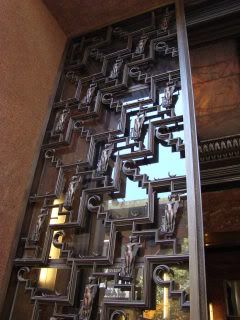 |  |
There were some other pictures later, and some light lunch at Veracruz, and then mate at El Cairo... But that was it. Sunday was rain, rain and more rain, but Monday (just as I'm posting this) seems to be heading for a very nice sunny day and a cool Christmas Eve.
For you who believe in those things, have a merry Christmas. The rest of us, take this holiday as a good excuse to get in touch and enjoy a few hours with your loved ones, and to exercise tolerance when meeting your inevitable not-so-loved ones. See you later!
Labels: christmas, palacio minetti, pictures, rosarigasinos, rosario
23 December 2007
A night of performers
No, this is not the same post as last weekend's... It's just that weekends are always full of culture these days. This time it was a Year's End event at the Flag Memorial, funded by a financial group. Friday was also Summer Day, although the southern hemisphere summer solstice fell on Saturday, December 22 this year, some 3 hours after the end of the event.
The show featured the Provincial Symphonic Orchestra, about 100 perfoming artists (for the dance parts), and 2 presenters who I would've just called "unnecessary" if they hadn't been so annoying. First there were a few melodies from old films' soundtracks (such as the overture of Gone with the Wind), then some tango dancing, then musicals (from Roxanne in the modern version of Moulin Rouge to some good ol' New York, New York), a lyrical gala, and a reprisal of the Cantemos la Navidad event. Save for the musicals, it was all very nice. The lighting and the choreography could've been better, but in any case musicals are not my thing. Tango dance, the same. The lyrical part was simply spotless.
Pictures follow. They came out much clearer than the ones I'd taken previously, because I used a tripod Marisa lent me (which she in turn got from her brother). I just set it up before me and shot bursts of six or five consecutive images at a time so I could pick the good ones.
There were fireworks later, but I had no time to set the camera correctly and decided to enjoy them with my eyes directly and let others take the pictures.
21 December 2007
El Che and his monument
 I was reading GoodAirs the other day and found the news about the monument to Ernesto Che Guevara. The monument is going to take up three tons of bronze, donated by thousands of people in the form of old keys and other objects, to sculptor Andrés Zerneri. I knew it had been decided to erect the monument here in Rosario, by a majority of votes of those who donated the bronze, but I didn't know when or where exactly.
I was reading GoodAirs the other day and found the news about the monument to Ernesto Che Guevara. The monument is going to take up three tons of bronze, donated by thousands of people in the form of old keys and other objects, to sculptor Andrés Zerneri. I knew it had been decided to erect the monument here in Rosario, by a majority of votes of those who donated the bronze, but I didn't know when or where exactly.
So, digging a little bit, I found the plans for Che's 80th birthday celebrations at the Municipality of Rosario website. It turns out there'll be several days (June 12–15, 2008) with a schedule of various events, including the unveiling of the monument, which will be located within the recently finished Parque Yrigoyen, near the old Central Córdoba Station. It's not a prime visitor spot, being on the very edge of the macrocentric area, but it's along one of the major avenues of the city (27 de Febrero) and should be easily accessible.
I expect there'll be a lot of debate about the convenience of honouring el Che. Some consider him a terrorist and a murderer; others call him a brave freedom fighter; others disregard his ideology and his methods and somewhat shallowly admire his struggle for the cause he believed in; for most he's little more than an icon of rebellion. I have no position on this, feeling that this is a subject for reflection, not debate. Historical facts are clear enough for everybody to learn and decide.
The monument will settle a debt that the city has had with itself for decades — it will be a reminder of the life of one of its most notable children. There are monuments to, and streets and parks named after, much more sinister historical characters. Call me a heartless postmodernist on this, but I'd rather have a big statue of a controversial man that gets tourists here that not having anything. And if the whole celebration and the monument get more young disinformed people to go to the library and read history books, all the better.
20 December 2007
Summer time
28 ºC | 40 ºC |
Summer seems to be arriving, finally. After the coldest winter in decades, and a cool spring with lots of sunny breezy days, it seems tomorrow, December 21, will be hot as hell, as befits the official day of the start of summer (the actual beginning of summer, so to speak, is the solstice, which this year falls on December 22 — at about 3 AM in Argentina, if you want to know that much).
Yours truly is not a man of extremes. I didn't like last winter, and I don't think I'll like this summer with tropical temperatures, even if it comes with sunny, comparatively clear days and bearably cool nights and mornings. The fact that I don't have a swimming pool and/or a beach nearby where I can spend the whole afternoon in submersion and possibly drinking fruit cocktails only makes it worse. The Patagonic summer I'm fleeing to in less than three weeks should be drier, but not necessarily less torrid.
19 December 2007
Justice being served
The long-unpunished murderers are finally getting what they deserve. Better late than never, as the saying goes, eight people who worked at the infamous Intelligence Battalion 601 during the dictatorship finally got their crimes and their sentences read aloud by a judge, after being granted the due process of law that their victims were denied. Seven military, one police officer and intelligence agent — including IB601's head, general Cristino Nicolaides, who got 25 years, the longest prison term in the lenient Argentine legal system, for kidnapping and torture.
In the early 1970s, the leftist Peronist guerrilla group Montoneros conducted bombings, kidnappings and assassinations. They (along with others) provided an excuse for the horrific dictatorship that came after them. In truth, the guerrillas were hardly a threat on the national level, and many were exterminated even before the military seized power in 1976. Montoneros was basically dead by 1977, their leaders in exile, but in 1980 they decided to return in secret for a "counteroffensive" on the military government. Somebody told on them. They were captured, taken to military facilities, tortured, then presumably killed.
Montoneros were terrorists, no discussion about that. There's no excuse for them. Yet they were citizens and human beings, and they should've been punished by the law. The dictatorship, however, didn't want legal punishment of crime; what they sought was suppressing opposition for good. They could've publicly displayed the captured terrorists as prizes, enacted a mock trial, executed them. But that wasn't the Argentine dictatorship's style: their leaders were torturers, sadistic killers, and yet also cowards. They kept little or no records (and they destroyed what they could); they denied everything; they justified themselves but refused to name what they were really doing for what it was; many have taken the secret of the location of their victims' bodies to their own graves.
This is the first trial involving a high military officer of the dictatorship after the repeal of the amnesty laws. Soon it will be one among many. The wounds are still fresh, and the criminals still walk among us.
18 December 2007
The Aeroclub tour
till vacation
My friend Gabriel called me at 9 PM to go out. Still a bit dizzy I took a shower, and off I went again to meet him and another friend, Mauro (the three of us are the ones going to Neuquén three weeks from now). We went into a noisy bar and just stayed there drinking beer, planning details of the trip, and gradually drifting towards less presentable topics. Considering I'd had more glasses of beer than hours of sleep during the previous 48 hours, I dragged myself back home with remarkable self-confidence. At noon I woke up and packed my gear for the Rosarigasinos photo tour of the Aeroclub Rosario.

I took a bus, fetched Marisa on the way, and we both arrived in Silvia's house. We waited for Lisandro, and then the four of us went on Silvia's car to Alvear, a small town south of Rosario, right next to Villa Gobernador Gálvez. Other people were arriving at the same time; when everybody was there we were 21 (I think) plus several children and two Beagle dogs.
The Aeroclub has a number of small planes and gliders and provides them (for a fee) for short flights over Rosario. I understand that the airplane's flight goes along the coast of the Paraná River, passes over the city center, and continues north until the Rosario–Victoria Bridge; it lasts 20 to 30 minutes. The glider is more dependent on the winds, so the flight path and length varies. The Aeroclub provides the planes and the pilots; the flight you pay after you touch down. You can also practise parachuting.
Most of us thought it a bit expensive for the time spent on the air (either flight was about AR$70; the parachute was more expensive), so we stayed on the ground chatting, sipping mate, eating cake and facturas and cookies, and taking pictures of flying objects of the artificial and natural kinds, of each other, and even of dogs and a toad.


It was a delightful afternoon. It's officially not summer until December 21, but this time of the year is usually much hotter and wetter. This year, however, the weather has stayed comparatively cool. We had more than enough shade, and a nice breeze. As the sun went down it became a little too cool for T-shirts and shorts.
We returned to Rosario with the dusk. Silvia wanted to go have something to eat, or a drink, but it was getting late and the next day was Monday, so I declined. I hate when that has to happen... but hey, this weekend left no space to waste.
17 December 2007
The Volunteer Firemen tour
 Retelling the weekend will take more than usual, since I was touring several places and barely touched down at home to eat (twice) and sleep (once). So I'll do it in two installments.
Retelling the weekend will take more than usual, since I was touring several places and barely touched down at home to eat (twice) and sleep (once). So I'll do it in two installments.
After a Friday night partly spent on a graduation party for a photographer friend of mine, Saturday started with a tour to the headquarters of the Rosario Volunteer Firemen (with the Rosarigasinos). These guys are truly awesome. While one of them patiently explained to us a myriad details about their job and their equipment, another one put on full firefighting gear and demonstrated the gas mask. A 18-year-old female cadet (the daughter of the first one) gave us even more inside information and anecdotes, both funny and not so.
We took hundreds of pictures of the whole place, the rooms, the equipment, the tools. I was delighted to discover an ancient Isuzu truck with the old Isuzu logo in Japanese (featuring the [nowadays almost unseen] hiragana iteration character), and an old R. E. Dietz 211 gyrating lantern. One of my fellow photographers' children and one of their friends came along, and had non-stop fun climbing on the fire trucks, ringing the alarm bell, and spraying us all (and our cameras, alas) with a high-power hose.
(I'll be uploading more pictures soon enough.)
The Volunteer Firemen receive very little monetary help from anyone, and they occupy old facilities that aren't really appropriate; you can tell that they're passionate about what they do, and they strive to do the most and the best under the circumstances. Considering they have families and day jobs, their efforts are laudable.
We are seriously thinking about turning the whole photo group thing into something with a solidary, social goal — for example, making Rosario-themed calendars with our pictures and donating the money (or the rights) to people like the Volunteer Firemen. Some legal juggling is needed, as well as contacts, and lots of patience to deal with bureaucracy. And of course, this is almost holiday and vacation season, so it's difficult to plan anything until March next year. But we're on it.
Labels: firefighting, good things, photo safari, rosarigasinos, rosario
14 December 2007
The politician's mind
I often say that the politician's mind is beyond my comprehension, beyond any understanding on the part of we the people. Politicians (especially when they're only politicians, and even more so when they've been for a long time) are not people, they move on different rules, and they see the world with different senses, moral values, and filters.
That's why I can't understand, for example, the resistance of the national government to acknowledge the obvious problem of creeping inflation, with the pathetic stream of doublespeak that results from the public expression of this denial, and why I could never understand the failure of the Santa Fe provincial government to do the very simple things it should've done to ensure victory for its candidate. There were many, many dark spots in the Peronist administration, but the largest obstacles to their removal (as I see it) were the maddening entanglement of personal loyalties and personal feuds, ridiculous bureaucratic delays, and sheer tradition — the tradition of just going on as before even as the people more and more loudly demand for things to change.
On his first day as governor of Santa Fe, Hermes Binner had the police fences around the Grey House removed (they'd been set up to deter demonstrators from trashing the government house), used the front door to get into his office (where the previous governor entered through the back door), and went around the other offices introducing himself to the employees, who were both terrified and very pleased. None of these marks Binner as an outstanding human being or even a good politician; all can be interpreted as plain inexpensive PR and nothing else.
Binner then signed his first decree, cutting his own powers to appoint judges at whim; in this he followed Néstor Kirchner's example, and he took good care of noting this explicitly. And then he announced he'll set aside 30 million pesos, effective immediately, to repair public schools during the summer, so that they're fit for use when the school season begins next March.
Both of these things are minor expenses (political in the former case, economic in the latter), and they were never beyond the powers of former governor Obeid. Why did he let schools turn into dirty, decrepit traps, while public opinion grew indignant by the day after each news report showing their pitiful state? Why did he not impose limits on his own powers to appoint judges, seeing how society distrusts the judiciary for its undue political ties? Why did he spend millions in advertising things no-one actually saw or cared about?
You've already read here about tons of other awful things the previous government did or did not, apparently not noticing or willfully ignoring the political consequences. I can only guess that politicians' minds are alien to our shared reality. If this the case, let's hope Hermes Binner doesn't get caught up in that, after this start off on the right foot.
13 December 2007
Translating Borges
This should be directed to a new blog, but I already have too many, so it stays here. It's an English translation of the poem Las causas ("The Causes"), by Jorge Luis Borges, who is one of the very few writers whose poetry I can read all the time, and (I believe) the only poet to have earned his own space in my library. Let it serve as a break between the latest politics-burdened posts and the ones to come, and maybe as incitement for one more person to start reading Borges.
The poem is almost completely composed of literary/historical references, both external and internal to Borges' own work. If you don't know what something means, just note it down and check it out later.
The translation is entirely mine, though it was based on one I found in the net, which I believe to be also a self-made translation, in this case by someone whose first language is English (there's a telling mistake in the next-to-last line).
The Causes
by Jorge Luis Borges
The sunsets and generations.
The days and none was the first.
The coolness of water in Adam's
throat. Orderly Paradise.
The eye deciphering the dark.
The love of wolves at dawn.
The word. The hexameter. The mirror.
The Tower of Babel and pride.
The moon that Chaldeans gazed at.
The innumerable sands of the Ganges.
Chuang-Tzu and the butterfly that dreams him.
The golden apples on the islands.
The steps in the wandering labyrinth.
Penelope's infinite tapestry.
The Stoics' circular time.
The coin in the dead man's mouth.
The weight of the sword on the scale.
Each drop of water in the clepsydra.
The eagles, the auspicious days, the legions.
Caesar on the morning of Pharsalia.
The shadow of the crosses over the earth.
The chess and algebra of the Persian.
The footprints of long migrations.
The conquest of kingdoms by the sword.
The relentless compass. The open sea.
The clock's echo in memory.
The king beheaded by the ax.
The incalculable dust which was armies.
The nightingale's voice in Denmark.
The calligrapher's meticulous line.
The face of the suicidal one in the mirror.
The gambler's card. Greedy gold.
The shapes of a cloud in the desert.
Every arabesque in the kaleidoscope.
Each regret and each tear.
All those things were necessary
so that our hands would meet.
Labels: argentina, jorge luis borges, literature, personal, poetry, translation
12 December 2007
Strike me down
The municipal public employees are on strike since yesterday, and for the nth time, asking for a raise. I've been wanting to see a photo exhibition at the Museo de la Ciudad, but since it's run by those very municipal employees, it's impossible. Last week on Tuesday I went to the museum, and only after ten minutes of looking around did I remember the employees were on strike. It wasn't a waste, because the museum is after all within a beautiful park and I was accompanied by a beautiful lady, but the exhibition (which I'm told is large and very good) remains unseen to me.
I don't know what the municipal employees are trying to do here. I understand that prices have gone up and the Christmas/New Year season brings even more expenses than usual, but everyone in the government offices has half their things packed for vacations already, and they're going to get a customary "adjustment" salary raise first thing next year.
On the other hand, I don't get why (besides tradition) government offices have to change at this time of the year. Nobody wants to dress up and hear long speeches, everyone wants to leave town and flee the scorching summer for the beach or the mountains, and no-one wants to start anything that demands work. The general consensus at my workplace is that the heavy restructuring that governor Hermes Binner will surely effect on the provincial public administration will not begin until March, which means four lost months just because the office-taking was done in December.
Binner will face troubles soon too, since now that there's a Rosario Socialist in the Grey House (the government seat, in Santa Fe City) and many Rosarinos will be moving there from the municipal administration to become provincial officials, information and gossip will travel faster, and already the news is that (as everyone suspected) the municipal employees of Rosario are much better paid than us, their counterparts in the province, and much better treated. One of the subtly stated campaign devices of Binner's was that he could do for the province what he had done for Rosario, which everyone agrees has turned into a much nicer city during the past Socialist administrations (Cavallero, twice Binner, and Lifschitz). So we (or our union) will surely be joining the municipal workers in Rosario, asking not only for a raise, but for a raise that brings us closer to them.
And of course, looming above the whole country, there's union leader Hugo Moyano, already facing up to the Presidenta — in fact saying "If you don't give us what we want, we may not continue to be your allies". Cristina K really seems to be more comfortable around industrial moguls and other businessmen than close to Moyano and his vociferously thuggish supporters, who can strike Cristina in both figurative senses of the word, since they de facto command the distribution of goods throughout the country.
And that ends today's political rant. Useless, I know. At the end of it all, I still can't go see my exhibition...
11 December 2007
Cantemos la Navidad 2007
Yes, yours truly was there singing Christmas carols, along with 12,000 other people, invocations to the eternal grace of (the non-existant) God and all, and enjoying every moment of it. I blame my girlfriend, she blames me. Truth be told, it was a fabulous night with great vibes, so there's really nothing to blame.
Cantemos la Navidad is an annual event, sponsored by a well-known local insurance company and has enjoyed popularity for almost 20 years (if I recall correctly). The director of the choir, Cristián Hernández Larguía, is a 86-year-old man with the energy of a teenager. He has the choir sing once, and then gets the people to sing along, aided by music sheets and lyrics handed to the attendees as they arrive at the site of the event.
I enjoy singing, though I prefer doing it while no-one's listening (or, as in this case, when everybody else is also singing). I would've sung praises to something other than imaginary holy virgins and their supposedly divine offspring, but anyway, those myths are not meant to be taken seriously in most parts of the civilized world, even in Christmas, anymore, and the idea was just having fun. Joining a vibrant song with thousands of fellow human beings really brings up your spirit.
10 December 2007
Cristinian Era
 So today's inauguration day! Cristina Fernández de Kirchner is going to take office, after receiving the presidential band and the presidential cane and, I suppose, the customary presidential hug, and we're starting four more years of Kirchnerism.
So today's inauguration day! Cristina Fernández de Kirchner is going to take office, after receiving the presidential band and the presidential cane and, I suppose, the customary presidential hug, and we're starting four more years of Kirchnerism.
Things haven't been that bad, to be sure. When you consider we could've been treated to a third serving of Carlos Menem, and then you see how much things have improved partly thanks to Kirchner's disregard for "orthodox" economics, we should all be kissing the ground Mr. K walks, if only it weren't so disgusting to kiss a ground sticky with the slime of Alberto Fernández, Julio De Vido et al.
Mauricio Macri took office in the Autonomous City of Buenos Aires (pop. 2.7 million) yesterday, and Hermes Binner will take office as governor of the Province of Santa Fe (pop. 3 million) tomorrow. A right-wing businessman without a real party, and a moderate Socialist politician with a party that gets to have a governor elected for the first time in history, are going to rule the third and fourth most populated districts in Argentina alongside Cristina, and one should be concerned how this will work out for federalism, seeing how the national administration has concentrated power and money lately.
But enough of politics. We're going to see endless discussions about this. Cristina's inaugural speech (I foresee), and also her dress, shoes, hairdo and makeup, are going to be dissected and thoroughly analyzed by self-proclaimed experts in... whatever it takes to do that analysis. The international media will remark the extraordinary election of a female president in a typical sexist Latin American country, ignoring the generalized feeling (confirmed by surveys) that most Argentinians couldn't care less if the president is a man, a woman, or a hermaphroditic chimpanzee-orangutan hybrid, as long as she/he/it solves some of the pressing problems that Néstor Kirchner has left us, or has left unattended.
So Cristina, I didn't vote for you, but we're on the same boat, and if you can't sail it right, we're sinking together (I know you won't do the "captain stays with her boat" thing, though — too practical for that). Good luck to you. You're going to need it.
09 December 2007
Logo change
I changed the D for Disorientation logo to one based on a picture I took yesterday (on the same series as the "little climbers" I posted on Flickr). The upside-down boat was just an overlong experiment and I got tired of it.
And that's about the only thing I've done today. Sunday Sleepy Sunday...
07 December 2007
Thursday night out
The Provincial Symphonic Orchestra of Rosario gave its (apparently traditional) end of year concert at the Flag Memorial. I've probably said this a million times already, but Rosario is always full of opportunities to experience art and culture for free, and the late spring and summer season are in particular are even better because there are so many things to do outdoors. In this case, on the stairs before the tower of the Monumento a la Bandera.
Now backtracking a little... It turns out I've been dating a certain lady from my photographers' group. We've only gone out a few times but I feel it's going quite fine. She posted the announcement of this concert on the group's discussion page and we agreed we'd go together (instead of me going to another event I'd spotted on the municipality's cultural schedule). I insisted that we keep silent about our thing until we had the chance to tell the group's guys and girls face to face. I'd say there was some astonishment and plenty of cheerfulness.
So, we went and met the rest of the people and sat on the stairs. The Symphonic rehearsed for a while, then started with tango music — wonderful pieces, two by the revolutionary composer Ástor Piazzolla and one by the bandoneón master Rodolfo "Cholo" Montironi. My lady plays the bandoneón herself and she's a tango über-fan, so she was delighted. I know next to nothing about tango, but listening to a full ensemble playing it live and with passion just has to make you appreciate it, if you've got blood in your veins.
A children's choir was called in then, and the orchestra started playing a selection of Bizet's opera Carmen, which you must surely know even if you don't like or listen to opera or classical music at all, because parts of the tune are so popular. Carmen is a French opera about a gypsy woman (and a few other gypsies as well), a soldier whose life she ruins, and a womanizer toréador (a torero, we'd say, i.e. a bullfighter), what we'd call a classic love triangle with a sordid environment and a tragic ending these days, although back when it was composed it was just considered dirty.
At about half the performance (in the middle of the Toréador, in fact), wind started to blow and some light rain began to fall. Within a couple of minutes, both the attendants and the orchestra decided it was time to run for cover before a full-fledged rainstorm unleashed itself. That didn't happen. The rain lasted a short time, but it was enough to ruin the last part of the event. The crowd poured down the exits and only stopped briefly for a final applause.
We were ravenously hungry, so we walked up Córdoba St. to find a place to eat, and found one that sold very respectable, gigantic hot sandwiches with fries, for a very good price. Now being surrounded by photographers, whose ilk I know too well, I knew they'd try to snap a picture of the newly-assembled couple doing the cute things couples do in public and post it on Flickr for everyone to see, thus ruining my theatrical idea of keeping it secret for those who weren't there until we could surprise them. So I stuck my hand out blocking the camera's view at the first attempt, and all seemed to be OK. Then came the inevitable group photo. Being such a fool, I casually composed myself in a less-than-innocent pose, and sure enough, the picture was posted and only then (this morning) I realized I'd blown my cover. Ah well.
So that's it. I confess I'm more than a little nervous about this new (and as yet unlabeled) relationship, having been unattached for quite a while, and on top of it she reads this blog, so she'll be reading this and who knows what she'll think of my enthusiasm. Can't be so bad, though — I have much worse defects to worry about.
Labels: culture, events, live music, personal, rosarigasinos, rosario
06 December 2007
The willful ignorance of reality
I'm not into sentimentalism. A shocking image of a poor child, in a half-serious personal blog, I'd call in very bad taste, usually. But here's the thing: this child's image is not shocking to us anymore. That's the real tragedy. We've grown accustomed to poverty, monstrously revisiting the callousness that former president Carlos Menem showed, quoting from Scripture: "The poor will always be with you", when told that poverty, amid the economic exhuberance of the first part of his administration, was as bad as always. We no longer see the poor child, because both our government and ourselves are playing the same game of ignoring the darker parts of reality.
The 2008 budget was just passed, and true to its Kirchnerist fatherhood, it's a masterpiece of doublethink. GDP growth is estimated as 4%, which is so low compared to the Chinese-like rates of the last years that Argentina would actually have to enter a deep recession next year to not surpass it by sheer inertia. Inflation, well... nobody cares about the officially estimated rate anyway, as everybody rightly assumes it'll have nothing to do with reality.
The government has been boasting the high GDP figures since its steep upwards trend began, but bizarrely enough it also seems to claim that the economy's on the brink of collapse. K even tried to get an extension of the Economic Emergency Law, that he's been using to manage our money in a lot of creative ways since he took office, but so far the Senate hasn't approved of it (though it may already have by the time you read this).
"So we're doing brightly and want everybody to know this and vote for us and thank us immensely... but we're drawing up a comparatively conservative budget... because we're in an emergency... even though we're almost back to normal... but any problems we may have are not because we're in an emergency, which we aren't, but because we came out of it so fast that we got dizzy."
Among all this mess, of course, the poor continue to be poor, the rich continue to be rich, and (seemingly) all's right with the world. So the picture that begins this post is just a reminder, to you and to myself, that something's profoundly wrong, and we're passing by, oblivious to it.
05 December 2007
All hail la Presidenta
It seems that both our presidents (current and elect) want to celebrate, and they're going to give everybody (well, national public employees) a day off work on December 10, so they can attend, or at least watch live, the inauguration of Queen Cristina of the Unwrinkled Visage. There'll be a suggestion to the provincial governments and to the Buenos Aires City administration as well, to do the same with their own employees.
I haven't heard anything from the outgoing governor in that respect yet, but I doubt he'll resist the temptation of one last populist measure, and one that pleases the Supreme Leader in the best Peronist tradition, to boot.
Governor-elect Hermes Binner will take office the next day (Tuesday, December 11) since he, too, will be attending the Presidenta's inauguration on Monday, when he formally gets his turn. Binner has been careful not to criticize the K administration, which is a disappointment for many of us, though it's true that he's been elected to rule a province that both profits and badly needs the K economic model to continue running, and that the Socialist Party to which he belongs does in fact criticize and oppose Kirchner's policies, in Congress when it's supposed to. (Of course, opposition in Congress is a joke, since K has an "automatic majority" and the Front for Victory legislators merely do as they're told.)
I really couldn't care less about Cristina's inauguration, and I can safely bet most of my compatriots, including those who voted for her, feel the same. Who can be enthusiastic at what seems to be merely an administrative change, after a hollow campaign and a boring election with a result that was foreseeable months before?
On a last note, I hear public transport fees in Buenos Aires are going up, finally, because the incoming government wants to save on those massive subsidies that we all pay. I hear porteños complaining because a bus ticket will cost 90 cents, and all I can say is: Rosario's bus fee will be increased to AR$1.40 just before or after the year ends, so please, get real and stop whining.
03 December 2007
The answer is no
Yesterday, a slight majority of Venezuelans said "no" to a proposal to reform their national constitution. Among many changes intended to further the "Bolivarian Revolution", the proposed reform introduced the possibility of indefinite presidential reelection. Faced with defeat, president Hugo Chávez seemed resigned. He said, obliquely, that he preferred to lose in this manner than winning by a small margin and knowing it after a protracted vote count.
The results were 50.7% for NO and 49.3% for YES, which is indeed a very small difference, but the count was completed very quickly considering more than 9 million people went to the polls. The whole day was surprisingly uneventful. Chávez seems to be one of those guys you either love or hate, and since the reform was plainly intended to turn him into a dictator for life, it must be a demonstration of Venezuelans' maturity that no incidents were reported between pro-Chávez and anti-Chávez people, and that Chávez himself, being a textbook example of magic realism, reacted with such calm.
This result means that Chávez will not be reelected, and though his policies may remain popular with half of the country, the one who takes his place won't be exactly like him and will have to resist the urge to cling to power.
One has to consider how this will impact the whole hemisphere. Venezuela has the largest oil reserves in the Americas, and Chávez has been using oil money to favour some countries, such as Argentina and Cuba. Having a lot of money derived from one of the most precious non-renewable resources on Earth, coupled with a lot of political power, means Chávez felt like he could say and do anything, from calling George W. Bush the Devil (or more charmingly "Mr. Danger") to graciously provide megatons of fuel oil at discount price to Argentina, from insulting a former president of Spain to parading around with Iran's Holocaust-denying current president.
Chávez has just received the first "no" in his whole political life. And that's a good thing. We don't need a dictatorship, benevolent or not, democratically elected or forcefully imposed, either to the left or to the right, in Latin America. I try to think we've all grown past that. I hope Hugo Chávez will be as smart as he seems to be, and recognize that his time is over for a while.
01 December 2007
Flickr Places
till vacation
— coincidentally the one that I have as my desktop wallpaper. As a bonus, Flickr Places gives you a little map and the current temperature.




